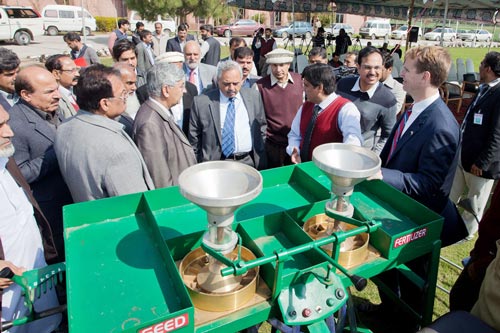By Yahya Rauf and Imtiaz Muhammad/CIMMYT
In collaboration with the Pakistan Agricultural Research Council (PARC) and the U.S. Department of Agriculture (USDA), CIMMYT organized a ceremony at the National Agricultural Research Center (NARC), Islamabad, to present wheat planters to various research institutions and universities under the Wheat Productivity Enhancement Project (WPEP).
CIMMYT Country Representative Imtiaz Muhammad highlighted the importance of these newly imported small-plot planters, which will replace the traditional hand-sowing crop systems and antiquated machinery currently used by many of the Pakistan national programs. The planters will bring precision and efficiency to research trials.
Planters will be used in the coming wheat season by all WPEP partner institutes and will be tested at small farms for wheat cultivation. The technology will be transferred to farmers to improve crop productivity once it is successful.

Clay Hamilton, USDA agriculture counselor in Pakistan, said the machinery handover ceremony was an example of the successful scientific collaboration between the United States and Pakistan and institutes like CIMMYT, which is critical in order to achieve better results in agriculture production. This year, CIMMYT, PARC and USDA are celebrating the 50th anniversary of Dr. Norman Borlaug beginning his work in Pakistan to improve wheat productivity.
Seerat Asghar, the secretary of the Ministry of National Food Security and Research (MNFS&R), acknowledged the ongoing technology transfer to Pakistan from the U.S. and CIMMYT. PARC Chairman Iftikhar Ahmad said WPEP achieved its goal of increased productivity by introducing disease-resistant wheat varieties, building research capacity, improving disease surveillance systems, developing seed distribution systems and modernizing national crop development programs through upgrading infrastructure and equipment. Moreover, Pakistan is now prepared to cope with the challenges of Ug99 while also developing new wheat varieties to help meet increasing food demand.
 Nutrition, health and food security
Nutrition, health and food security 
